#acoustic coupler
Photo

1983
421 notes
·
View notes
Text
R2 Gets Loaded

STAR WARS EPISODE I: The Phantom Menace 01:47:35
#Star Wars#Episode I#The Phantom Menace#Naboo#Theed#Battle of Theed#Battle of Naboo#Theed Hangar#N-1 starfighter#R2-D2#secondary holoprojector#actuating coupler#hydraulic arm shaft#heat exhaust#system lubricant filter/reservoir#system diagnostic ports#polarity sink#system ventilation#acoustic signaller#primary holoprojector#primary photoreceptor#radar eye#hangar ladder#non-slip treads#droid brain
1 note
·
View note
Text
it is time to be old on the internet: TFP Ratchet's hatred of 2010 era human tech is hilarious
every time Ratchet complains about shitty human technology in TFP, it's so funny to me, that shit is so good
because, I mean, I grew up with the first computer in my house being a fucking Tandy 1000, which to be fair wasn't exactly the hottest model even then, but still LMAO
the first modem I ever messed with as a kid was the wood box phone receiver type, the acoustic coupler ones, which was my dad's, and he only had it because his job at a local university meant he could borrow one from their tech lab (so we didn't technically own it)
if I remember correctly, the one we had ran at 300 baud, which was fucking amazing for such a set up at the time. slightly later AOL dial up looked like lightning speed compared to that shit.
my first chat rooms were BBS/Usenet (whenever I could connect) and IRC chats. now everyone has Discord and I still don't understand how that shit works lmao but that's more of a me problem and less of an age problem, I think
we got dial up (in the "modern" sense of it being AOL dial up service with the infamous hell noises) in my household in 1994, back when it was pretty much a brand new thing (at least for AOL), and I remember the Eternal September Usenet rush, lmao
imagine if TFP took place in the 80s/90s, oh my god
(I'm assuming TFP takes place in roughly 2010 because that's when the show premiered, and Miko has some kind of Razr-inspired flip phone, so if we assume it's supposed to be based on the first model of Razr, then at the earliest that places the show in 2004)
Ratchet would have gone completely insane with old school internet capable consumer level human tech
Ratchet: "How do I look at photos on this monitor?"
80s Raf: "what"
Ratchet: "what"
oh god now I want an 80s/90s TFP AU so fucking bad. imagine 80s Raf. it's so good
oh god, IMAGINE 90s RAF. just getting traumatised by terrifying shitty mid-90s FMV horror games. this poor boy. but imagine his hype when the PS1 would come out in the USA in 1995. the hype would be so fucking real. lmao
also for those of you who are Younger and Blessed With Good Internet From An Early Age, if you want a good idea of old school internet shit, go ahead and watch WarGames (1983) and look up 2600 Magazine and Mondo 2000 if you don't already know about those.
(personally I consider WarGames and Hackers (1995) to be the two best simultaneously dumbest and best movie depictions of computer bullshit in their respective eras, although Hackers was more of a thing that informed cyber culture after it released rather than reflecting actual hacker culture as it was at that exact time but anyway, please watch them if you have not seen them already, you will love this shit lmao)
I assume almost all of you already know about this stuff, but just in case, I want to mention it. those two movies are really good. lol
anyway, Ratchet dealing with early internet. early shitty human tech. or at least the 90s shit. imagine Ratchet having to listen to the fucking dial up screeching. the kids having to look through geocities webrings to see if any images of the bots had been leaked on any conspiracy websites. just 10/10 lmaooo
"I hate talking to machines" Ratchet, buddy, you have NO IDEA how bad it could have been!!!
anyway I'm old, I guess that's the point of this post LOL
83 notes
·
View notes
Text
Enshitternet

Going to Burning Man? Catch me on Tuesday at 2:40pm on the Center Camp Stage for a talk about enshittification and how to reverse it; on Wednesday at noon, I'm hosting Dr Patrick Ball at Liminal Labs (6:15/F) for a talk on using statistics to prove high-level culpability in the recruitment of child soldiers.
On September 6 at 7pm, I'll be hosting Naomi Klein at the LA Public Library for the launch of Doppelganger.
On September 12 at 7pm, I'll be at Toronto's Another Story Bookshop with my new book The Internet Con: How to Seize the Means of Computation.

This week on my podcast, I read "Enshitternet: The old, good internet deserves a new, good internet," my recent Medium column about building a better internet:
https://doctorow.medium.com/enshitternet-c1d4252e5c6b
As John @hodgman is fond of reminding us, "nostalgia is a toxic impulse." It is easy for an old net.hand like me to fall into the trap of shaking his fist at the cloud. Having been on the other side of that dynamic, I can tell you it's no fun.
When I got on BBSes in the early 1980s, there was an omnipresent chorus of grumps insisting that the move from honest acoustic couplers to decadent modems was the end of the Golden Age of telecommunications:
https://en.wikipedia.org/wiki/Acoustic_coupler
When I got on Usenet shortly thereafter, the Unix Greybeard set never passed up an opportunity to tell us newcomers that the Fidonet-Usenet bridge allowed the barbarian hordes to overwhelm their Athenian marketplace of ideas:
https://technicshistory.com/2020/06/25/the-era-of-fragmentation-part-4-the-anarchists/
When I joined The WELL in the late 1980s, I was repeatedly assured that the good times were over, and that we would never see their like again:
https://www.well.com/
Now that I'm 52, I've learned to recognize this dynamic, from the Eternal September:
https://en.wikipedia.org/wiki/Eternal_September
to the moral panic over menuing systems replacing CLIs:
https://www.eff.org/deeplinks/2020/02/gopher-when-adversarial-interoperability-burrowed-under-gatekeepers-fortresses
to the culture wars over what would happen when the net got a normie-friendly GUI:
https://www.dejavu.org/1993win.htm
And yeah, I've done it too, explaining "Why I won’t buy an iPad (and think you shouldn’t, either)":
https://memex.craphound.com/2010/04/01/why-i-wont-buy-an-ipad-and-think-you-shouldnt-either/
But there's a key difference between my own warnings about the enshittification that new "user friendly" technologies would engender and all those other AARP members' complaints: they were wrong, and I was right.
As Tom Eastman reminded us, the internet really was better, back before it became "five giant websites filled with screenshots of text of the other four":
https://twitter.com/tveastman/status/1069674780826071040
The underlying pathology of that enshittification wasn't the UI, or whether it involved an app store. As the Luddites knew, the important thing about a technology isn't what it does, but who it does it for and who it does it to:
https://locusmag.com/2022/01/cory-doctorow-science-fiction-is-a-luddite-literature/
The problem wasn't which technology we used. There is nothing inherent about touchscreens that makes them into prisons that trap users, rather than walled gardens that protect them.
Likewise, the problem wasn't who made that technology. We didn't swap wise UUCP Monks for venal tech bros. The early tech world was full of public-spirited sysops, but it was also full of would-be monopolists who tried – and failed – to get us to "stop talking to each other and start buying things":
https://catvalente.substack.com/p/stop-talking-to-each-other-and-start
If it wasn't the technology that killed the old, good internet, and if it wasn't the people who killed the old, good internet, where did the enshitternet come from?
It wasn't the wrong tech, it wasn't the wrong people: it was the wrong rules. After all, the Apple ][+ went on sale the year Ronald Reagan hit the campaign trail. Consumer tech was the first industry born after antitrust was dismantled, and it created the modern monopoly playbook: buying and merging with competitors. The resulting unity of purpose and anticompetitive profit margins allowed tech to capture its regulators and secure favorable court and legislative outcomes.
The simultaneous drawdown of antitrust enforcement and growth of tech meant that tech's long-standing cycle of renewal was ended. Tech companies that owed their existence to their ability to reverse-engineer incumbent companies' products and make interoperable replacements and add-ons were able to ban anyone else from doing unto them as they did unto the giants that came before them:
https://doctorow.medium.com/let-the-platforms-burn-6fb3e6c0d980
The pirates became admirals, and set about creating a "felony contempt of business model":
https://pluralistic.net/2022/12/03/painful-burning-dribble/#law-of-intended-consequences
They changed the rules to ensure that they could "disrupt" anyone they chose, but could themselves mobilize the full might of the US government to prevent anyone from disrupting them:
https://locusmag.com/2019/01/cory-doctorow-disruption-for-thee-but-not-for-me/
The old, good internet was the internet we we able to make while tech was still realizing the new anticompetitive powers it had at its disposal, and it disappeared because every administration, R and D, from Reagan to Trump, yanked more and more Jenga blocks out of the antitrust tower.
In other words: the old, good internet was always doomed, because it was being frantically built in an ever-contracting zone of freedom to tinker, where technologies could be operated by and for the people who used them.
Today, the Biden administration has ushered in a new era of antitrust renewal, planting the seeds of a disenshittification movement that will tame corporate power rather than nurturing it:
https://www.eff.org/de/deeplinks/2021/08/party-its-1979-og-antitrust-back-baby
In other words, we are living in the first days of a better nation.
In other words, rather than restoring the old, good internet, we should build a new, good internet.
What is a new, good internet? It's an internet where it's legal to:
reverse-engineer the products and services you use, to add interoperability to them so you can leave a social network without leaving your friends:
https://www.eff.org/interoperablefacebook
jailbreak devices to remove antifeatures, like surveillance, ink-locking, or repair-blocking:
https://pluralistic.net/2023/04/17/have-you-tried-not-spying/#coppa
move your media files and apps from any platform to any device or service, even if the company that sold them to you objects:
https://pluralistic.net/2022/09/07/audible-exclusive/#audiblegate
A new, good internet gives powers to users, and takes power away from corporations:
https://doctorow.medium.com/twiddler-1b5c9690cce6
On a new, good internet, companies can't practice algorithmic wage discrimination:
https://pluralistic.net/2023/04/12/algorithmic-wage-discrimination/#fishers-of-men
They can't turn search into an auction between companies that match your query and companies that want to sell you fakes and knockoffs:
https://pluralistic.net/2022/11/28/enshittification/#relentless-payola
They can't charge rent to the people whose feeds you asked to read for the privilege of reaching you:
https://pluralistic.net/2022/12/10/e2e/#the-censors-pen
In fact, a new, good internet is one where we euthanize rentiers:
https://pluralistic.net/2023/07/24/rent-to-pwn/#kitt-is-a-demon
On the new good internet, your boss can't use bossware to turn "work from home" into "live at work":
https://pluralistic.net/2021/02/24/gwb-rumsfeld-monsters/#bossware
And on top of that, you have the right to hack that bossware to undetectably disable it (and hackers have the right to sell or give you that hack):
https://www.eff.org/deeplinks/2021/08/tech-rights-are-workers-rights-doordash-edition
On the new, good internet, we stop pretending that tech is stealing content from news companies, and focus on how tech steals money from the news, with app taxes, rigged ad markets, surveillance ads, and payola:
https://www.eff.org/deeplinks/2023/04/saving-news-big-tech
The new, good internet is an internet where we seize the means of computation. It's an internet operated by and for the people who use it.
Hodgman is right. Nostalgia is a toxic impulse. The point of making a new, good internet isn't to revive the old, good internet. There were plenty of problems with the old, good internet. The point is to make a new, good internet that is the worthy successor to the old, good internet – and to consign the enshitternet to the scrapheap of history, an unfortunate transitional stage between one good internet and another.
Here's a link to the podcast episode:
https://craphound.com/news/2023/08/21/enshitternet-the-old-good-internet-deserves-a-new-good-internet/
and here's a direct link to the MP3 (hosting courtesy of the Internet Archive; they'll host your stuff for free, forever):
https://archive.org/download/Cory_Doctorow_Podcast_448/Cory_Doctorow_Podcast_448_-_Enshitternet.mp3
and here's a link to my podcast's RSS feed:
https://feeds.feedburner.com/doctorow_podcast

If you'd like an essay-formatted version of this post to read or share, here's a link to it on pluralistic.net, my surveillance-free, ad-free, tracker-free blog:
https://pluralistic.net/2023/08/22/the-new-good-internet/#the-old-good-internet

Image:
Cryteria (modified)
https://commons.wikimedia.org/wiki/File:HAL9000.svg
CC BY 3.0
https://creativecommons.org/licenses/by/3.0/deed.en
#podcasts#mp3s#enshittification#nostalgia#nostalgia is a toxic impulse#spoken word#the old good internet#the new good internet
60 notes
·
View notes
Note
how do you feel about the internet? do you have predictions for what it will be in the future? tell me your thoughts!
(disclaimer: am currently trying to make an emotional wordless picture book about friendship and the changing nature of the internet and this is not wholly disconnected from that but it's also very much not /for/ that, it's just that thinking about my own perspectives has made me curious for other perspectives.)
Sorry I lost track of this ask for so long.
I still remember the first time I was sitting at a computer connected to another computer somewhere else (this was via an acoustic coupler and a super-slow-by-today's-standards modem, using my dad's "portable computer" to talk to a Unix system running Colossal Cave at JPL) when a human being on the other end broke in and typed, "Throw axe at dwarf." That would have been 1981 or so.
Ever since I've thought of the Internet as a pretty amazing way to reduce the distance between two people located anywhere in the world to zero, at least for information purposes. As an extreme introvert who nevertheless craves human interaction, this seems like a win.
These days it remains part of my life, mostly as a force for good. It turns out that being connected to everyone everywhere all at once has its downside, but with active curation the harm can be minimized.
I have no idea about the future. I suspect the Internet will continue to be a lot like it has been, only more so. More connection to more people, including cherished human beings who make my life better, along with the other kind to whom I wish all the best as I work to limit my exposure to them.
I don't think I gave a very good answer, for which I apologize. I hope you can find some better perspectives from some of those other voices out there.
10 notes
·
View notes
Note
What is your favourite retro electronic? So let's say anything b4 1990. Either for aesthetics, function "it rocks major ass" etc.
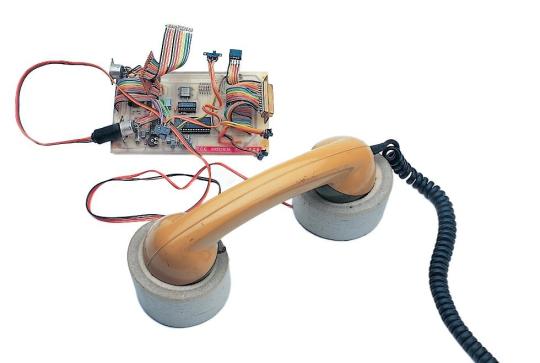
Back in the 80s here you couldn't just buy a modem to transfer data and access internet-like services (BTX), you had to rent it from the national post service (Bundespost) for around 50 DM a month for an inferior model.
Therefore a local hacker organization released this CCC-Modem in 1984, a DIY kit to build an acoustic coupler (turns digital data into funny noise that your regular phone can pick up). You'd literally press your phone handset into the foam parts to make your kit talk into the phone. The foam parts were sourced from plumbing supplies which is why it was also called "Data Toilet"!
This was of course very much illegal :D but also far cheaper at 300DM. There were also more professional looking acoustic couplers for sale that you didn't have to assemble first, they look pretty but lack the hacker spirit:
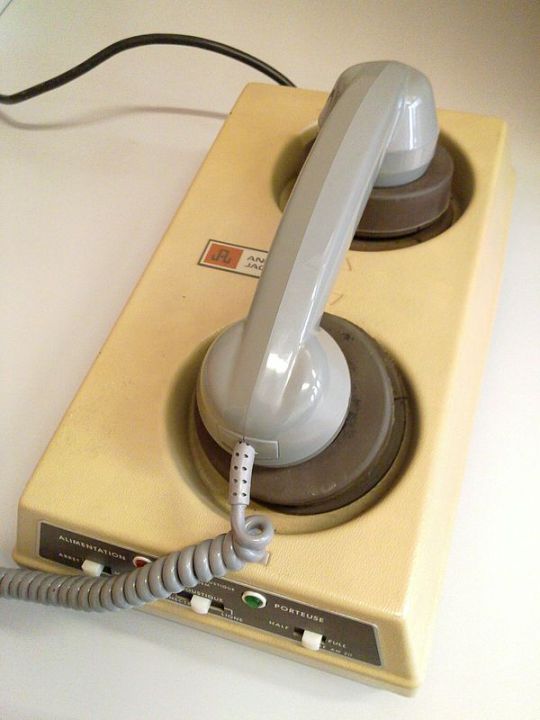
#the Bundespost was split into Telekom (privatized) and Post in 1995#you might know i work at an isp and i have seen Bundespost devices that are still in use#mainly because they've been forgotten for 30 years and no one knew what the devices did so nobody touched them#until they made painful noises and since they couldn't call the bundespost anymore they called their current isp#tech
5 notes
·
View notes
Text
“Conversational” AI Is Really Bad At Conversations
See on Scoop.it - Education 2.0 & 3.0
In 1977, my father, a computer scientist, brought home a teletype terminal (a keyboard and a printer, no screen) and an acoustic coupler (a box with two suction-cups that matched up with the speaker and mic on the receiver of a standard Bell phone), and he connected it to the DEC PDP minicomputer at the University of Toronto. I was seven years old. I was hooked.
2 notes
·
View notes
Text
If You Are A Millennial, Keep Walking.
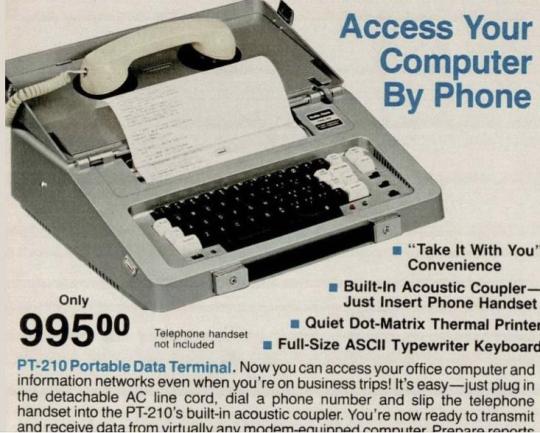
I am so tired of millennials complaining about the tech we use these days. Complaints about Internet speed, companies that initiate data caps, the size of smartphones, and other complaints are everywhere. The next millennial that gripes to me is going to have to spend a few hours listening to me talk about the state of computers in 1983, when I got my first luggable computer. It weighed 25 pounds, had a keyboard connected by a cable, a 10 inch green screen, and no graphics. A mouse? Are you kidding me? Internet access? What is that? So, call me a boomer if you like. Every new tech gadget I have used since 1983 has been a revelation to me, and I smile every time I think about my tech and gadget journey. I once sent an email from a pay phone in Yosemite National Park back to my office using a portable 300 baud modem by connecting the pay phone handset and an acoustic coupler. I know I sound like a grand dad talking about walking 20 miles to school; but, children, you have no idea of the journey boomers have been on. So, spare me your whining and complaining, and keep walking. Jeez.
2 notes
·
View notes
Text
youtube
Things Guitarists Should Never Do
Tuning down
Remove the ground
Assume you know everything
Sell to the store
Always practice quiet
Tense up
Soundcheck without earplugs
Use compressed air to clean
Tour without airtags
Use solid couplers
Be that acoustic guy
Run an amp without a load
Be a jealous hater
Expose your guitar to intense climate change
Ignore your guitars' humidity
Deal with fingernail pain
Tell yourself you'll be happy if...
1 note
·
View note
Text
MODARTT launches ORGANTEQ2

Organteq offers realtime synthesis of organ pipes sound based on physical model. By capturing the complex physics of flue and reed pipes, it brings a vivid instrument of stunning playability and breathtaking realism.
Everything in Organteq can be tweaked - from the composition of the organ to the sound of each pipe - making it possible to reproduce a wide variety of existing organs or to explore unknowns musical lands.

ORGANTEQ features
Organteq offers over four thousand pipes, inspired from many great organ builders of French Romantic and German Baroque periods : A. Cavaillé-Coll, G. Silbermann, T. Tröst and many others.
These 68 organ stops, ranging from 32' to 1', can be assigned to three manual keyboards with a five-octave range, and a pedal keyboard with thirty-two notes.
Every pipe of every stop can be voiced to your taste through many user parameters.
Physical modelling
The core synthesis algorithms of Organteq are based on aeroacoustics of the organ pipes. The equations of the air jet growing and impacting the labium, the equations of the beating reed, as well as the ones that describe the pipes resonances, are used to synthetize organ pipe sounds.
In addition, the acoustics radiation from the pipes ends to the division box first, and then to the main space. This makes it possible to listen to the organ sounds in various configurations.

What's inside the ORGANTEQ2
ADVANCED PHYSICAL MODELING
- jet/labium aero-acoustics and beating reed
- pipe resonances
- sound radiation
- division acoustics
- room acoustics
LARGE COLLECTION OF UNIQUE STOPS
- Unique stops from 32' to 1':
- 34 German Baroque stops
- 34 French Romantic stops
VERSATILE CONSOLE
- 3 manual keyboard and one pedalboard
- Up to 50 customizable stop slots
- 3 stop-per-stop assignable and customizable expression pedal
- 4 monophonic couplers (bass and treble)
- 24-step stop-per-stop assignable crescendo pedal
ADVANCED OUTPUT SETTINGS
- noise volume, stereo width, C/C# separation
- reverb settings
- audio routing mix matrix up to 8 channels
- division box parameters (EQ, box reverb, blending with room acoustics)
PIPE-SPECIFIC PARAMETERS
- each stop can be voiced pipe-per-pipe:
- volume
- detune
- brightness
- air noise
- wind jitter
- chiff amount
- tremulant sensitivity
MORE THAN 30 BUILT-IN PRESETS
- German Baroque
- French Romantic
- Historical organs
- Experimental organs
ERGONOMIC UI
- adapted for organists using up to 3 keyboards
- but playable with only one keybaord
- Easy MIDI mapping with MIDI learn feature… yet fully customisable
- Touchscreen compatibility
- VoiceOver (macOS) and Narrator (Windows) integration
SEAMLESS INTEGRATION IN DAW
- 64-bit plug-ins AU/VST/VST3/AAX
- easy to share project on other computers
https://www.youtube.com/watch?v=VLenpb_YGWo
You can find out more information via MODARTT website.
Read the full article
0 notes
Text
Global Laser Cladding Market 2022 Key Business Strategies by Leading Industry Players, Analysis 2028
The Laser Cladding market will change significantly from the previous year. Over the next six years, will register a CAGR in terms of revenue, and the global market size will reach USD in millions by 2028.
The Global Laser Cladding Market from 2022 to 2028, which offers thorough information on the state of the market at the moment and identifies the key drivers, long-term strategies, and key players' successful development.
The increasing use of fiber lasers in laser cladding applications, the rising need for additive manufacturing and quick manufacturing, as well as the gradual shift from traditional laser technologies to laser cladding, are some of the key factors propelling the market for laser cladding.
Get Sample Reports: https://introspectivemarketresearch.com/request/15911
Laser Cladding Market - Size, Competitive Landscape and Segmentation Analysis:
Laser Cladding Market Reports provide a high-level overview of market segments by product type, applications, leading key players, and regions, as well as market statistics. The research insights focus on the impact of the Covid-19 epidemic on performance and offers a thorough examination of the current market and market dynamics. This crucial understanding of the report's objective can help you make better strategic decisions about investment markets by assessing elements that may affect current and future market circumstances. The leading key players in the Global and Regional market are summarized in a research to understand their future strategies for growth in the market.
The key players covered in the Laser Cladding market report are:
· Laser Cladding Technologies (Singapore)
· Lumentum Operations LLC (US)
· LaserBond (Australia)
· TRUMPF (Germany)
· Curtiss-Wright Corporation (US)
· IPG Photonics Corporation (US)
· Technogenia (France)
· OC Oerlikon Management AG (Switzerland)
· Jenoptik (Germany)
· Laserline (Germany)
· Lincoln Laser Solutions (Canada)
· Coherent Inc (US)
· Hayden Corporation (US)
· TLM Laser (UK)
· Han's Laser Technology Industry Group Co.Ltd. (China)
By Type, Laser Cladding has been segmented into:
· Diode laser
· Fiber laser
· CO2 laser
· Acoustic laser
· Others
By End-use Industry, Laser Cladding has been segmented into:
· Aerospace & Defense
· Automotive
· Agriculture
· Power Generation
· Oil & gas
· Mining and Construction
· Others
Market Segment by Regions and Countries Level Analysis:
· North America (U.S., Canada, Mexico)
· Europe (Germany, U.K., France, Italy, Russia, Spain etc.)
· Asia-Pacific (China, India, Japan, Southeast Asia etc.)
· South America (Brazil, Argentina etc.)
· Middle East & Africa (Saudi Arabia, South Africa etc.)
If You Have Any Query Of This Market Report, Visit:
https://introspectivemarketresearch.com/inquiry/15911
Covid-19 Impact and Recovery Analysis on Industry:
The effects of COVID-19 on consumer demand and the laser cladding market have a detrimental overall effect on the laser industry. Given that China is home to the bulk of laser producers and suppliers of raw materials, it is anticipated that short-term laser manufacturing would fall more than anticipated. The industry continues to rely largely on China for the production of lasers, including subcomponents like laser sources, galvanometers, output couplers, and others. Due to pandemic-related supply problems, there is currently a constrained supply of laser products.
The Laser Cladding System Market Report Highlights:
· A detailed overview of the parent market
· Changing market dynamics in the industry
· In-depth market segmentation
· Historical, current and projected market size in terms of volume and value
· Recent industry trends and developments
Purchase this report: @ https://introspectivemarketresearch.com/checkout/?user=1&_sid=15911
0 notes
Photo
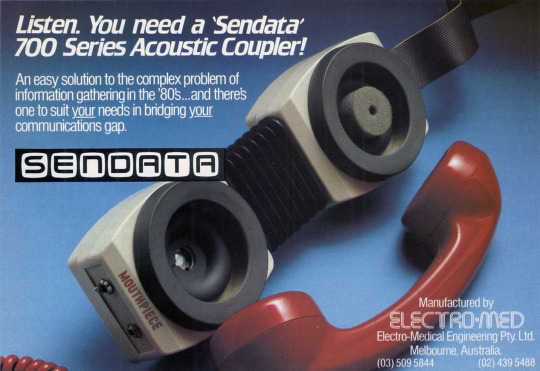
Sendata 700B Acoustic Coupler (1985)
749 notes
·
View notes
Text
[ Whistling, Beeping ]
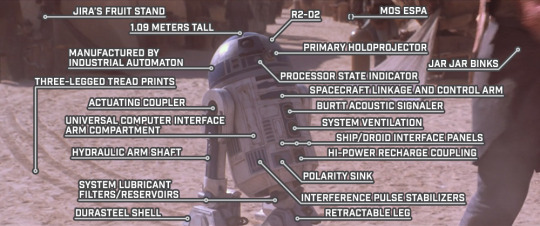
STAR WARS EPISODE I: The Phantom Menace 00:38:03
#Star Wars#Episode I#The Phantom Menace#Tatooine#Xelric Draw#Mos Espa#Jira's fruit stand#R2-D2#Industrial Automaton#actuating coupler#universal computer interface arm compartment#hydraulic arm shaft#system lubrication filters/reservoirs#durasteel#primary holoprojector#Jar Jar Binks#processor state indicator#spacecraft linkage and control arm#Burtt#acoustic signaler#system ventilation#ship/droid interface panel#hi-power recharge coupling#polarity sink#interference pulse stabilizer#retractable leg
1 note
·
View note
Photo
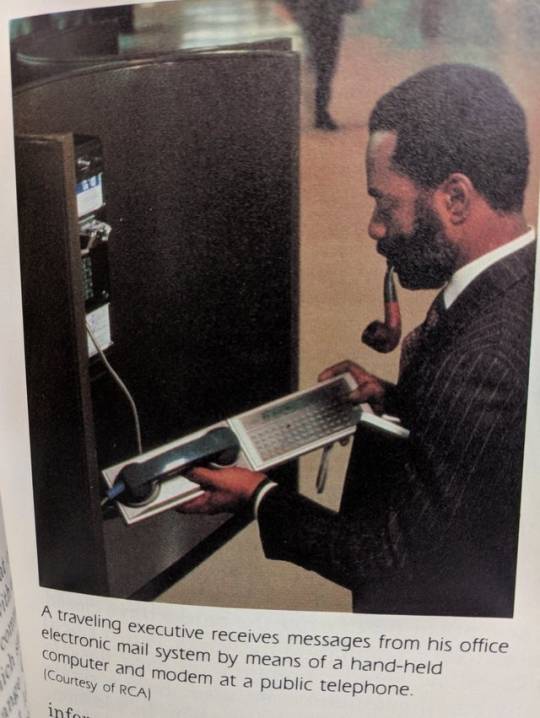
Smoking gentleman using an acoustic coupler to send an email with a payphone. Early 1980s.
0 notes
Text
I’m an official Old Person (I turned 52 last month). According to the AARP, that means that I am now officially entitled to complain that back in my day, things used to be better.
I am suspicious of this impulse! When I started dialing BBSes in the early 1980s, the Old Hands there told me that it was all downhill after acoustic couplers and that modems were degrading the noosphere into a fallen paradise.
When I got on Usenet a couple years later, every disagreement would feature some Unix Greybeard telling us that the Fidonet gateway had opened the floodgates for dumbass kids like me who were stinking up the joint and adding nothing of value.
By the time I joined The WELL in the late 1980s, it was too late: the rarified Athenian agora had been overrun by barbarians and the Age of Reason was over.
Then there was the Eternal September, the moral degeneracy of menuing systems and the wicked temptations of a GUI.
I even got in on the act, explaining “Why I won’t buy an iPad (and think you shouldn’t, either).”
Here’s the thing: all those other Cranky Olds complaining that we were on a greased slide to Hell were wrong.
I was right.
-Enshitternet: The old, good internet deserves a new, good internet
#enshitternet#enshittification#the internet con#seize the means of computation#the old good internet#the new good internet
40 notes
·
View notes
Text

Smoking gentleman using an acoustic coupler to send an email with a payphone. Early 1980s.
4 notes
·
View notes